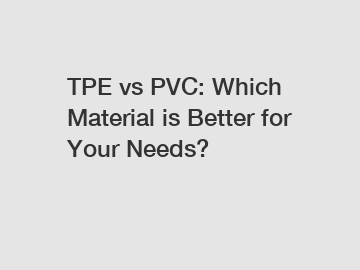TPE vs PVC: Which Material is Better for Your Needs?
When it comes to choosing the right material for your needs, especially in the realm of manufacturing and product development, there are many factors to consider. Two common materials that are often used in a variety of applications are TPE (Thermoplastic Elastomer) and PVC (Polyvinyl Chloride). Both materials have their own unique properties and characteristics that make them suitable for different uses. In this blog post, we will take a closer look at TPE vs PVC and discuss which material may be better suited for your specific needs.
TPE, or Thermoplastic Elastomer, is a versatile material that combines the properties of rubber with the processing capabilities of traditional thermoplastics. TPEs are known for their flexibility, durability, and resistance to weathering and chemicals. They are also widely used in applications that require good grip, cushioning, and impact resistance. TPEs are often used in consumer products such as seals, gaskets, handles, and protective casings, as well as in automotive components, medical devices, and industrial equipment.
On the other hand, PVC, or Polyvinyl Chloride, is a synthetic thermoplastic polymer that is known for its versatility, durability, and affordability. PVC is a rigid material that is commonly used in construction, plumbing, electrical, and automotive applications. PVC is also known for its resistance to chemicals, weathering, and abrasion. PVC is often used in products such as pipes, fittings, profiles, and packaging materials.

So, which material is better for your needs? The answer depends on your specific requirements and the characteristics of each material. Here are some key factors to consider when choosing between TPE and PVC:
Flexibility and Durability:
TPEs are known for their flexibility and elasticity, making them ideal for applications that require a soft touch and good cushioning. TPEs can be easily molded into complex shapes and designs, making them suitable for a wide range of products. TPEs also have excellent tear and abrasion resistance, making them durable and long-lasting. On the other hand, PVC is a rigid material that is less flexible than TPE. PVC is known for its rigidity and strength, making it suitable for applications that require a stiffer material. PVC is also highly resistant to impact and abrasion, making it ideal for products that need to withstand harsh environments.
Chemical and Weather Resistance:
TPEs are known for their excellent resistance to chemicals, oils, and weathering. TPEs do not contain chlorine or other harmful chemicals, making them safe for use in applications that require contact with food or medical products. TPEs are also resistant to UV radiation, ozone, and extreme temperatures, making them suitable for outdoor applications. On the other hand, PVC is known for its resistance to acids, alkalis, and solvents. PVC is also highly resistant to weathering, making it ideal for outdoor applications that require exposure to the elements.
Cost and Processing:
TPEs are typically more expensive than PVC, but they offer greater design flexibility and processing capabilities. TPEs can be easily molded, extruded, and formed into complex shapes, making them suitable for products that require intricate designs. TPEs are also recyclable and eco-friendly, making them a sustainable choice for environmentally conscious manufacturers. On the other hand, PVC is a cost-effective material that is easy to process and manufacture. PVC can be easily extruded, injection molded, and thermoformed, making it a versatile material for a wide range of applications.
In conclusion, both TPE and PVC have their own unique properties and characteristics that make them suitable for different applications. TPE is a flexible and durable material that is ideal for products that require good grip, cushioning, and impact resistance. PVC is a rigid and durable material that is ideal for products that require strength, rigidity, and chemical resistance. Ultimately, the choice between TPE and PVC will depend on your specific requirements and the characteristics of each material. Consider factors such as flexibility, durability, chemical resistance, weather resistance, cost, and processing capabilities when choosing between TPE and PVC for your needs.
The company is the world’s best mat making machine, car mat cutting machine factory, car mar cutting machine supplier. We are your one-stop shop for all needs. Our staff are highly-specialized and will help you find the product you need.


